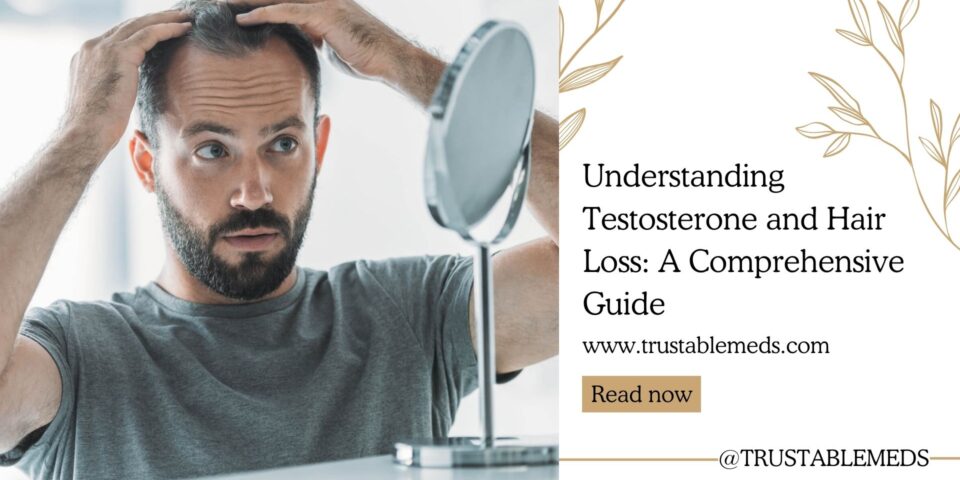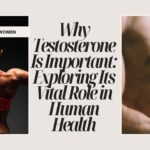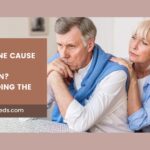Introduction to Testosterone
Testosterone, often dubbed the “male hormone,” is a vital hormone present in both men and women, although it’s predominantly associated with male characteristics. It belongs to a class of hormones called androgens and plays a crucial role in various bodily functions. Understanding the complex relationship between testosterone and hair loss is essential for effectively managing hair loss and promoting hair health
What is Testosterone?
Testosterone is a steroid hormone primarily produced in the testicles in men and ovaries in women, although the adrenal glands also secrete small amounts of it. It’s responsible for the development of male reproductive tissues and promotes secondary sexual characteristics such as increased muscle mass, bone density, and body hair growth.
Importance of Testosterone in the Body
Testosterone is not only essential for reproductive health but also influences mood, energy levels, and cognitive function. It contributes to the maintenance of muscle mass, bone density, and overall vitality. Additionally, testosterone affects libido and sexual function in both men and women.
Effects of Testosterone on Physical Appearance
One of the most noticeable effects of testosterone is its impact on physical appearance. In men, testosterone contributes to the development of facial hair, deepening of the voice, and the growth of body hair during puberty. It also influences muscle mass and distribution of fat in the body.
Testosterone Production and Regulation
The production of testosterone is regulated by a complex feedback loop involving the hypothalamus and pituitary gland in the brain, as well as the testes in men and ovaries in women. Hormonal balance is crucial for maintaining optimal testosterone levels, which can fluctuate throughout life due to various factors such as age, stress, and health conditions.
How does testosterone affect erectile function?
Testosterone helps to regulate blood flow to the penis. When testosterone levels are low, blood flow can be impaired, making it difficult to achieve or maintain an erection.
In addition, testosterone helps to produce nitric oxide, a chemical that relaxes the smooth muscles in the penis. These muscles need to relax in order for blood to flow into the penis and create an erection.
Kamagra polo 100 mg and Fildena ct 100 mg can be used to enhance your health and cure men’s impotence issues.
The Connection Between Testosterone and Hair Loss
Understanding the relationship between testosterone and hair loss requires insight into the hair growth cycle and the role of specific hormones, notably dihydrotestosterone (DHT).
Overview of Hair Growth Cycle
Unraveling the mystery of hair growth: a dance through four distinct phases – Anagen, Catagen, Telogen, and Exogen. Each phase is essential for the continuous renewal and shedding of hair follicles.
- Anagen Phase: This is the active growth phase when hair follicles are actively producing new hair.
- Catagen Phase: Transition phase where hair growth slows down, and the follicle prepares to shed the hair shaft.
- Telogen Phase: Resting phase where the hair follicle remains dormant before shedding the hair.
- Exogen Phase: The shedding phase where old hairs are released, allowing new hairs to grow in their place.
Understanding this cycle helps in comprehending how hair loss occurs and the factors that influence it.
Role of Dihydrotestosterone (DHT) in Hair Loss
Dihydrotestosterone (DHT) is a derivative of testosterone and is considered the primary hormone responsible for hair loss, particularly in individuals with a genetic predisposition. DHT binds to receptors in hair follicles, causing them to shrink over time, resulting in shorter, finer hair growth cycles.
Genetic Predisposition and Hormonal Imbalance
Genetics plays a significant role in determining an individual’s susceptibility to hair loss. Inherited genes can influence the body’s response to hormones like DHT, leading to a condition known as androgenetic alopecia, or male-pattern baldness. Hormonal imbalances, including fluctuations in testosterone levels, can exacerbate this condition.
Factors Contributing to Testosterone-Induced Hair Loss
Several factors contribute to testosterone-induced hair loss, ranging from age-related changes to lifestyle choices and medical conditions.
Age and Testosterone Levels
As individuals age, testosterone levels naturally decline, leading to changes in hair growth patterns and density. This age-related decline in testosterone can contribute to hair thinning and baldness, particularly in men.
Lifestyle and Environmental Factors
Various lifestyle factors and environmental influences can impact testosterone levels and contribute to hair loss.
- Diet and Nutrition: Poor dietary choices lacking essential nutrients can affect hormone production and hair health.
- Stress and Cortisol Levels: Chronic stress can elevate cortisol levels, which may disrupt hormone balance and contribute to hair loss.
- Environmental Toxins and Pollutants: Exposure to environmental pollutants and toxins can interfere with hormone regulation and exacerbate hair loss.
Medications and Medical Conditions
Certain medications and underlying health conditions can also influence testosterone levels and contribute to hair loss.
- Anabolic Steroids and Hormonal Treatments: The use of anabolic steroids or hormonal medications can disrupt natural hormone production and lead to hair loss.
- Underlying Health Conditions: Medical conditions such as thyroid disorders, autoimmune diseases, and hormonal imbalances can affect testosterone levels and contribute to hair loss.
Managing Testosterone-Induced Hair Loss
While testosterone hair loss can be distressing, several strategies can help manage and mitigate its effects.
Lifestyle Modifications for Hair Health
Making lifestyle changes can positively impact hair health and reduce the risk of hair loss.
- Balanced Diet and Nutritional Supplements: Consuming a diet rich in vitamins, minerals, and essential nutrients supports hair growth and follicle health. Consider incorporating foods high in antioxidants, omega-3 fatty acids, and biotin into your diet.
- Stress Management Techniques: Practicing stress-reduction techniques such as mindfulness, meditation, yoga, and deep breathing exercises can help lower cortisol levels and promote hair growth.
- Avoidance of Harmful Chemicals and Toxins: Minimize exposure to environmental pollutants, harsh chemicals in hair products, and heat styling tools to prevent damage to hair follicles.
Medical Interventions and Treatments
Several medical interventions and treatments are available to address testosterone-induced hair loss.
- Topical Solutions and Shampoos: Over-the-counter and prescription-strength topical solutions containing minoxidil can help stimulate hair growth and prevent further hair loss.
- Prescription Medications: Finasteride, a prescription medication, can inhibit the conversion of testosterone to DHT, effectively reducing hair loss and promoting hair regrowth in some individuals.
- Surgical Options: Hair Transplantation: Hair transplantation procedures involve transplanting hair follicles from donor sites to areas of thinning or baldness, restoring natural-looking hair growth.
Natural Remedies and Alternative Therapies
In addition to conventional treatments, some individuals may explore natural remedies and alternative therapies to address low t and hair loss.
Herbal Supplements and Extracts
Certain herbal supplements and extracts have shown promise in promoting hair growth and reducing hair loss.
- Saw Palmetto: Saw palmetto extract may help block the activity of 5-alpha-reductase, the enzyme responsible for converting testosterone to DHT, thereby reducing hair loss.
- Pumpkin Seed Oil: Pumpkin seed oil contains phytosterols and other compounds that may inhibit DHT production and support hair follicle health.
- Rosemary Oil: Rosemary oil has antimicrobial and anti-inflammatory properties and may help improve scalp circulation and stimulate hair growth.
Scalp Massage and Aromatherapy
Regular scalp massage with essential oils such as peppermint, lavender, and tea tree oil can improve blood circulation, nourish hair follicles, and promote relaxation, which may benefit overall hair health.
Acupuncture and Traditional Chinese Medicine (TCM) Approaches
Acupuncture and traditional Chinese medicine (TCM) modalities such as acupuncture, acupressure, and herbal remedies may help balance the body’s energy flow and address underlying imbalances contributing to hair loss.
The Importance of Consultation and Professional Advice
While exploring treatment options for hair loss low testosterone, it’s essential to seek guidance from healthcare professionals who specialize in hair restoration and dermatology.
Seeking Guidance from Healthcare Providers
Consulting with primary care physicians, dermatologists, or endocrinologists can help determine the underlying causes of hair loss and develop a personalized treatment plan tailored to individual needs.
Consulting Dermatologists and Trichologists
Dermatologists and trichologists specialize in diagnosing and treating hair and scalp conditions. They can provide expert advice on medical interventions, lifestyle modifications, and hair care routines to promote hair growth and minimize hair loss.
Understanding the Risks and Benefits of Treatment Options
Before initiating any treatment regimen, it’s crucial to understand the potential risks and benefits associated with each option. Discussing concerns and expectations with healthcare providers can help make informed decisions about managing hair loss effectively.
Developing a Personalized Hair Care Plan
Developing a personalized hair care plan involves considering factors such as lifestyle, budget, and treatment preferences. Healthcare providers can offer guidance on combining various approaches, including medical treatments, natural remedies, and lifestyle modifications, to achieve optimal results.
Conclusion
In conclusion, understanding the complex relationship between testosterone and hair loss is essential for effectively managing hair loss and promoting hair health. While testosterone plays a vital role in various bodily functions, imbalances and genetic predispositions can contribute to hair thinning and baldness.
Taking a holistic approach to hair care, incorporating lifestyle modifications, medical interventions, and natural remedies, can help mitigate the effects of testosterone-induced hair loss and promote healthy hair growth. Consulting with healthcare professionals and seeking personalized advice are critical steps in developing an effective treatment plan tailored to individual needs.
By prioritizing hair health and adopting proactive measures, individuals can regain confidence and embrace their unique hair journey with optimism and resilience.
FAQs (Frequently Asked Questions)
1. Can testosterone replacement therapy (trt hair loss) cause hair loss?
Testosterone replacement therapy (trt and hair loss) can potentially exacerbate hair loss in individuals genetically predisposed to androgenetic alopecia. However, the effects may vary depending on individual responses and the specific formulation of testosterone used in therapy.
2. Does testosterone cause hair loss?
Testosterone itself doesn’t, but its metabolite DHT can accelerate hair loss in people with genetic sensitivity.
3. How do you stop testosterone hair loss?
Stopping testosterone hair loss depends on the cause:
- If not on testosterone therapy: Consult a doctor to rule out other causes and explore options like minoxidil or finasteride (with caution for women).
- On testosterone therapy: Discuss with your doctor if reducing the dose, switching delivery methods, or using additional medications like finasteride (not recommended for women) is possible.
Remember, consulting a doctor is crucial for proper diagnosis and safe treatment options.
4. Can stress-induced hair loss be reversed?
Stress-induced hair loss, also known as telogen effluvium, is often reversible with proper stress management techniques, lifestyle modifications, and time. As stress levels decrease and the body returns to a state of equilibrium, hair growth typically resumes, and normal hair density is restored.
5. How to increase testosterone for hair growth?
Maintain a balanced diet, exercise regularly, manage stress, consider natural supplements, limit alcohol, and seek medical advice if needed.



